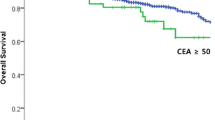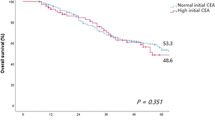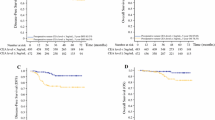Abstract
Purpose
To evaluate stage IIA colorectal cancer in terms of recurrence so as to discover whether high preoperative serum carcinoembryonic antigen (s-CEA) levels indicate that the patient should be included in a high-risk group in stage II colorectal cancer.
Methods
We retrospectively reviewed the records of 1543 patients with stage IIA colorectal cancer who underwent curative surgery between January 2000 and December 2007.
Results
The 5-year disease-free survival and overall survival rates were significantly lower in patients with a higher than normal preoperative s-CEA (90.5 % vs. 82.5 %, P < 0.001, and 92.4 % vs. 87.8 %, P = 0.034, respectively). Multivariate analysis revealed that elevated preoperative s-CEA level, preoperative obstruction, rectal cancer, and dissection of fewer than 12 nodes were independent statistically significant prognostic factors that predicted disease-free survival in patients with stage IIA disease after curative resection.
Conclusions
Elevated preoperative s-CEA concentration is a reliable predictor of recurrence after curative resection in patients with stage IIA colorectal cancer. Patients with stage IIA disease with elevated preoperative s-CEA level do worse than those with normal levels and might constitute a group to evaluate for adjuvant chemotherapy. Further studies on the effect of adjuvant chemotherapy in this group are needed.

Similar content being viewed by others
References
NIH Consensus Conference. Adjuvant therapy for patients with colon and rectal cancer. JAMA. 1990;264:1444–50.
Moertel CG, Fleming TR, Macdonald JS, et al. Levamisole and fluorouracil for adjuvant therapy of resected colon carcinoma. N Engl J Med. 1990;322:352–8.
O’Connell MJ, Laurie JA, Kahn M, et al. Prospectively randomized trial of postoperative adjuvant chemotherapy in patients with high-risk colon cancer. J Clin Oncol. 1998;16:295–300.
Andre T, Boni C, Mounedji-Boudiaf L, et al. Oxaliplatin, fluorouracil, and leucovorin as adjuvant treatment for colon cancer. N Engl J Med. 2004;350:2343–51.
Kuebler JP, Wieand HS, O’Connell MJ, et al. Oxaliplatin combined with weekly bolus fluorouracil and leucovorin as surgical adjuvant chemotherapy for stage II and III colon cancer: results from NSABP C-07. J Clin Oncol. 2007;25:2198–204.
Benson AB, Schrag D, Somerfield MR, et al. American Society of Clinical Oncology recommendations on adjuvant chemotherapy for stage II colon cancer. J Clin Oncol. 2004;22:3408–19.
Compton CC, Fielding LP, Burgart LJ, et al. Prognostic factors in colorectal cancer. College of American Pathologists Consensus Statement 1999. Arch Pathol Lab Med. 2000;124:979–94.
Duffy MJ. Carcinoembryonic antigen as a marker for colorectal cancer: is it clinically useful? Clin Chem. 2001;47:624–30.
Locker GY, Hamilton S, Harris J, et al. ASCO 2006 update of recommendations for the use of tumor markers in gastrointestinal cancer. J Clin Oncol. 2006;24:5313–27.
Wiratkapun S, Kraemer M, Seow-Choen F, et al. High preoperative serum carcinoembryonic antigen predicts metastatic recurrence in potentially curative colonic cancer: results of a five-year study. Dis Colon Rectum. 2001;44:231–5.
Park IJ, Kim HC, Yu CS, et al. Cutoff values of preoperative s-CEA levels for predicting survivals after curative resection of colorectal cancer. J Korean Med Sci. 2005;20:624–7.
Huh JW, Oh BR, Kim HR, et al. Preoperative carcinoembryonic antigen level as an independent prognostic factor in potentially curative colon cancer. J Surg Oncol. 2010;101:396–400.
Reiter W, Stieber P, Reuter C, et al. Multivariate analysis of the prognostic value of CEA and CA 19-9 serum levels in colorectal cancer. Anticancer Res. 2001;20:5195–8.
Takagawa R, Fujii S, Ohta M, et al. Preoperative serum carcinoembryonic antigen level as a predictive factor of recurrence after curative resection of colorectal cancer. Ann Surg Oncol. 2008;15:3433–9.
Ogata Y, Murakami H, Sasatomi T, et al. Elevated preoperative serum carcinoembrionic antigen level may be an effective indicator for needing adjuvant chemotherapy after potentially curative resection of stage II colon cancer. J Surg Oncol. 2009;99:65–70.
Beaudonnet A, Gounon G, Pichot J, et al. Sex- and age-related influences on carcinoembryonic antigen in blood. Clin Chem. 1981;27:771.
Herbeth B, Bagrel A. A study of factors influencing plasma CEA levels in an unselected population. Oncodev Biol Med. 1980;1:191–8.
Wang HS, Lin JK, Mou CY, et al. Long-term prognosis of patients with obstructing carcinoma of the right colon. Am J Surg. 2004;187:497–500.
Chen HS, Sheen-Chen SM. Obstruction and perforation in colorectal adenocarcinoma: an analysis of prognosis and current trends. Surgery. 2000;127:370–6.
Sarli L, Bader G, Iusco D, et al. Number of lymph nodes examined and prognosis of TNM stage II colorectal cancer. Eur J Cancer. 2005;41:272–9.
Swanson RS, Compton CC, Stewart AK, et al. The prognosis of T3N0 colon cancer is dependent on the number of lymph nodes examined. Ann Surg Oncol. 2003;10:65–71.
Le Voyer TE, Sigurdson ER, Hanlon AL, et al. Colon cancer survival is associated with increasing number of lymph nodes analyzed: a secondary survey of intergroup trial INT-0089. J Clin Oncol. 2003;21:2912–9.
Tan E, Gouvas N, Nicholls RJ, et al. Diagnostic precision of carcinoembryonic antigen in the detection of recurrence of colorectal cancer. Surg Oncol. 2009;18:15–24.
Holt A, Nelson RA, Lai L. Surveillance with serial serum carcinoembryonic levels detect colorectal cancer recurrences in patients who are initial nonsecretors. Am Surg. 2010;76:1100–3.
Acknowledgment
Supported in part by the Asan Institute for Life Sciences (2011-069), and the Korea Health 21 R&D Project (A062254), Ministry of Health, Welfare, and Family Affairs, Republic of Korea.
Disclosure
The authors declare no conflict of interest.
Author information
Authors and Affiliations
Corresponding author
Rights and permissions
About this article
Cite this article
Kim, C.W., Yoon, Y.S., Park, I.J. et al. Elevation of Preoperative s-CEA Concentration in Stage IIA Colorectal Cancer Can Also Be a High Risk Factor for Stage II Patients. Ann Surg Oncol 20, 2914–2920 (2013). https://doi.org/10.1245/s10434-013-2919-4
Received:
Published:
Issue Date:
DOI: https://doi.org/10.1245/s10434-013-2919-4




